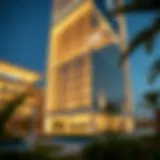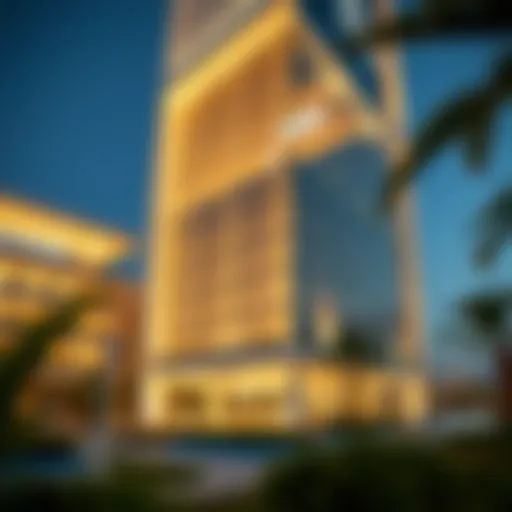Ramadan Kareem 2023: Traditions and Real Estate Insights
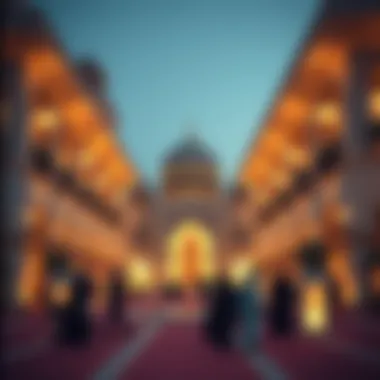

Intro
Ramadan is not just a month of fasting; it represents a season rich with customs and vibrant cultural practices, especially in the United Arab Emirates. In 2023, this sacred time unfolds amid a unique backdrop of traditions meeting modern lifestyles.
The importance of Ramadan in the UAE mirrors broader Islamic customs, yet, it is also infused with local flavors that distinguish it from practices in other regions. People gather for prayers, families share meals, and communities come together, fostering an atmosphere of unity. Yet, Ramadan's influence stretches far beyond the spiritual, impacting various sectors, notably real estate.
As the month progresses, dynamics within the real estate market shift, influenced by an increase in community activities and economic vitality that often arises during this time. For investors and homebuyers, understanding these trends is crucial for navigating the ever-evolving Dubai property landscape.
In the following sections, we will delve deep into the various facets of Ramadan in the UAE, exploring the market trends that arise, the cultural significance of the celebrations, and the implications for those looking to buy or invest in property during this vibrant period. This comprehensive insight aims to not only detail the current landscape but also provide a roadmap for future considerations in a market that is as dynamic as the festivities surrounding Ramadan.
Understanding Ramadan in the UAE
The month of Ramadan holds unique importance in the United Arab Emirates, shaping not only the religious landscape but also the social and economic fabric of the nation. A deep understanding of Ramadan in the UAE allows one to appreciate how it influences daily life, traditions, and even business dynamics. This article aims to shed light on various crucial aspects of the observance. Whether you are an investor, homebuyer, or an analyst, knowledge about Ramadan's impact can influence decisions and interactions during this sacred period.
History and Origins
Ramadan's roots run deep in Islamic history. It marks the month when the Quran was revealed to Prophet Muhammad, serving as a time for spiritual reflection and heightened devotion. The traditions have been upheld for centuries, yet the ways in which Ramadan is celebrated in the UAE showcase a blend of historical reverence and modern-day customs. In traditional settings, families would often gather to break their fast with a meal called iftar. The sense of unity during this month has evolved, as various communities have brought their own flavors to the observance, creating a melting pot of customs.
The arrival of Ramadan is usually determined by the sighting of the new moon, which adds an air of anticipation and communal excitement. This yearly phenomenon not only connects the community spiritually but also emphasizes the significance of togetherness during the holy month.
Religious Significance
Islamic teachings highlight Ramadan as a time for purification and self-discipline. Fasting during this month is not merely a ritual; it is an act of worship designed to foster empathy for the less fortunate and promote gratitude for one’s blessings. In the UAE, the Emirati community, along with expatriates from diverse backgrounds, comes together to observe the fast.
Spiritual benefits of Ramadan include:
- Increased prayer and reflection: Many find themselves attending mosques more frequently for special nightly prayers known as Taraweeh.
- Deepening of faith: The practices of fasting and nighttime prayers help to strengthen one’s relationship with Allah.
- Community bonding: The shared experience of fasting and breaking the fast fosters closer ties among family, friends, and neighbors.
Modern Observance
In recent years, Ramadan in the UAE has seen a significant evolution, marrying tradition with contemporary practices. Modern technology plays a role in enhancing the experience—people turn to mobile applications to keep track of prayer times and fasting hours. Ramadan has also become a time for numerous charitable activities, as giving back to the community is seen as a vital component of observance.
Events like food drives to support the needy have flourished, highlighting a spirit of generosity that is palpable throughout the country. Local businesses adapt by extending their hours and offering special promotions tailored for the season, ensuring that both traditional and modern observances work harmoniously.
In summary, recognizing the layers of history, religious practice, and modern adaptations during Ramadan enriches our understanding of this sacred month and its impact on society. Advocates for business and community engagement should take note of these nuances, as they present opportunities for meaningful interaction within the UAE's dynamic environment.
Ramadan Overview
The month of Ramadan holds profound importance for Muslims, especially in a country like the UAE where the cultural and religious heritage intertwine deeply. In 2023, Ramadan begins anew, offering a fresh opportunity for reflection, prayer, and community interaction. Understanding the nuances of this sacred month enriches the experience not just for Muslims, but also for those observing the traditions around them, and the implications it may carry across various sectors, including real estate.
Significance of the Dates
The specific dates of Ramadan shift each year due to the lunar calendar, making it vital for the community to stay updated. In 2023, Ramadan is projected to commence in the evening of March 22, with the first day of fasting falling on March 23. The sighting of the crescent moon marks this transition, fostering a sense of anticipation and excitement as families begin preparations. This period is not merely about abstaining from food and drink, but it constitutes a time for heightened spiritual awareness, self-discipline, and engaging with the community.
Why Knowing the Dates Matters:
- Planning Gatherings: Families often coordinate iftar meals and social events well in advance, so understanding when Ramadan is set to start helps them plan accordingly.
- Economic Activities: Businesses adjust their operational hours and promotions during this time. Knowing the start date can help investors and entrepreneurs align their marketing strategies effectively.
- Cultural Awareness: For expatriates and tourists, understanding these dates cultivates respect for local customs, allowing them to participate more meaningfully in community activities.
Official Announcements
It is customary in the UAE for the moon sighting committee to make an official announcement regarding the commencement of Ramadan. Typically, this announcement happens the day before the month begins, adding an element of community anticipation and excitement. This is often broadcasted via television, radio, and social media platforms, making it accessible to all citizens and residents.
These announcements are not just formalities; they serve several crucial functions:
- Clarity: They eliminate ambiguity regarding the start and end of fasting, allowing people to plan their daily lives.
- Regulatory Compliance: Businesses and institutions often rely on these dates to align their operations in accordance with local laws and cultural sensitivities.
"In the UAE, the call to prayer reverberates throughout the cities, signifying not just the start of Ramadan, but also the anticipation of community spirit."
Understanding the significance of these dates and public announcements is intricate for investors, particularly those involved in the real estate market. It sets the rhythm by influencing when families move, settle, or seek temporary accommodations during this reflective period. This data is pivotal for strategizing investments or engaging with potential buyers.
Cultural Practices during Ramadan
Cultural practices during Ramadan reflect the deep-rooted customs and rituals intertwined with religious observance in the UAE. The holy month's significance reaches beyond mere fasting, encompassing community interactions, rich traditions, and unique culinary experiences. Embracing these cultural practices fosters a sense of belonging and unity among families and communities. They also highlight the importance of charity, hospitality, and social gatherings, which are vital components of Ramadan in the UAE.
Iftar Traditions
Common Iftar Foods
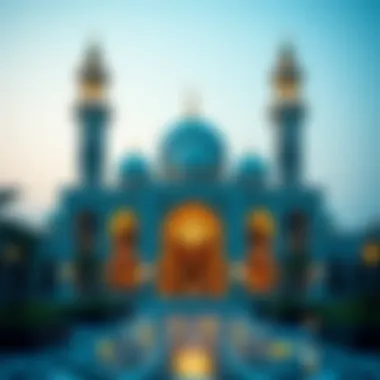

Common Iftar foods in the UAE present a delightful blend of flavors and culinary heritage that rejuvenate the spirit after a day of fasting. Popular dishes during Iftar include dates, lentil soup, and various meat dishes typically served with rice. Each food carries its own significance—dates, for instance, are not just a source of energy replenishment but are also consumed due to religious customs.
This variety in food showcases the Emirati hospitality. Many families take pride in preparing these traditional dishes, which also strengthens community bonds, as neighbors often share meals. Other popular dishes like Machboos, a spiced rice dish with meat, highlights the cultural diversity that characterizes the UAE. The enjoyment of diverse flavors reflects a sense of warmth and togetherness, making it a cherished time during the month of Ramadan.
Social Gatherings
Social gatherings during Ramadan are a lifeline for community cohesion. After a long day of fasting, families and friends come together to break their fast, creating an atmosphere rife with joy and sharing. These gatherings are not just about food; they are about connecting and rekindling relationships. The act of inviting neighbors over for Iftar symbolizes generosity and the spirit of giving that Ramadan embodies.
Moreover, these gatherings often become larger community events, where people from varying backgrounds come together, fostering understanding and dialogue among cultures. Such interactions are fundamental for nurturing social bonds within the fabric of UAE society. In addition, the shared experience of fasting allows families to bond, reflect, and share stories, which helps in strengthening family dynamics.
Suhoor Customs
Suhoor customs, the pre-dawn meal, are an integral part of Ramadan. Traditionally, this meal consists of wholesome and nutritious foods that help sustain individuals throughout the day of fasting. Many families make it a point to eat together, reinforcing the familial ties during this sacred month. In the UAE, popular Suhoor items include foul (fava beans), labneh (strained yogurt), and an array of breads. Additionally, there is often an emphasis on hydration, as ample water and juices are consumed to ensure endurance through the heat of the day. The act of gathering for Suhoor encourages a spirit of companionship before the day of fasting begins, making it an important ritual in daily Ramadan life.
Community Outreach
Charitable Contributions
Charitable contributions during Ramadan hold enormous significance, as the holy month encourages generosity and empathy towards those in need. Donations can come in various forms, from monetary contributions to food drives and clothing donations. In the UAE, numerous organizations run campaigns targeting the underprivileged, providing meals to families who struggle during Ramadan.
This phenomenon of giving enriches the collective spirit of the community, as it emphasizes that assisting one another is part of the UAE's core values. Moreover, many individuals find personal fulfillment and happiness in contributing to charitable causes. Projects often ramp up during this time, allowing everyone to participate regardless of their economic status.
Volunteering Opportunities
Volunteering opportunities serve as a powerful avenue for community engagement during Ramadan. Many organizations recruit volunteers to assist with feeding those in need, organizing events, or managing food drives. Engaging in volunteer work not only benefits those receiving aid but also nurtures a sense of purpose among volunteers.
The unique aspect of volunteering during Ramadan is that it often fosters inter-cultural interactions among people who might not ordinarily cross paths. This mingling is genius in bridging gaps and creating rapport across diverse demographics. For some, volunteering becomes both a social and spiritual experience, enriching their understanding and appreciation of the community in which they live. Additionally, being involved in Ramadan outreach can lead to lasting friendships, making it a practical yet emotionally rewarding practice that resonates long after the month ends.
Economic Activities during Ramadan
Ramadan marks a significant time not only for spiritual reflection but also for various economic activities in the UAE. The holy month has a unique impact on consumer behavior, which in turn drives changes in the local economy. For investors and homebuyers, the evolving market dynamics during Ramadan provides both opportunities and challenges that warrant careful attention.
Impact on Retail and Dining
The retail and dining sectors experience a substantial uptick during Ramadan. Shops across the UAE often extend their hours, catering to the late-night shoppers who prefer to explore after breaking their fast. Special promotions—like discounted Ramadan bundles—encourage consumers to purchase more. Retailers strategically curate their product offerings to align with the needs of Ramadan, featuring everything from traditional sweets to home essentials for iftar.
Dining experiences take on a unique flavor as well. Restaurants craft special menus, often including traditional dishes traditionally enjoyed during Ramadan that draw both locals and tourists. Notably, venues in Dubai, such as Al Fanar Restaurant & Café, host iftar offers that highlight Emirati cuisine, further attracting diners keen to explore local flavors. This cultural and culinary emphasis helps in not only bolstering restaurant revenues but also promoting local gastronomy among visitors.
Highlights of the Retail and Dining Upsurge:
- Extended Shopping Hours: Most retail outlets adjust their hours to accommodate nocturnal shopping habits.
- Special Promotions: Discounts and special offers increase foot traffic towards stores.
- Cultural Cuisine: The rise of dining offers focused on traditional foods not only enriches the experiences of diners but also supports local eateries financially.
As a result, both sectors play a crucial role in revitalizing the economy during this month, making it an area of keen interest for investors looking to capitalize on these trends.
Increased Demand for Rentals
The demand for rentals sees a spike during Ramadan, driven largely by families gathering to celebrate the month together. Many expatriates return to the UAE during this period to spend the holy month with loved ones, leading to a bustling rental market. Short-term rentals, in particular, become popular as families seek temporary accommodations near each other or close to mosques.
In Dubai, landlords often adjust their strategies to meet this demand, offering flexible leasing terms to attract tenants. This can present enticing opportunities for investors, as the increased traffic during Ramadan can lead to higher occupancy rates for rental properties. Additionally, areas known for their vibrant Ramadan activities, such as Dubai Creek and the Downtown area, tend to see more demand.
Considerations for Investors in Rental Market:
- Look out for Popular Locations: Areas known for community events and iftar gatherings are likely to attract more renters.
- Short-Term vs Long-Term Rentals: Weigh the benefits of short-term leasing during Ramadan against long-term tenancy.
- Prepare for Renovations: Properties may require adjustments or enhancements to meet the seasonal demand for family-friendly spaces.
As Ramadan progresses, the interplay of cultural significance with economic viability unfolds, creating a landscape of opportunities for savvy investors and homebuyers in the UAE.
Ramadan's Effect on Real Estate
Ramadan, the holy month of fasting, holds a significant position in the cultural fabric of the UAE. It influences various sectors, notably the real estate market. The observance of Ramadan alters transaction patterns and property interest, leading to unique dynamics in buying and leasing properties. For investors, homebuyers, and real estate agents, understanding these shifts is crucial during this period.
Market Trends During Ramadan
The real estate landscape often sees fluctuations during Ramadan. Primarily, interest in short-term rentals spikes while long-term leases might slow, especially in urban hotspots like Dubai. Potential renters and buyers tend to prioritize homes that are family-friendly and close to community amenities such as mosques and iftar gatherings.
Many developers resort to promotional offers tailored for Ramadan, which enhances buyer interest. Special financing offers or discounts can often be found, as sellers aim to close deals before the month ends. Furthermore, it's common for properties that showcase amenities like swimming pools, open terraces, or proximity to places of worship to draw more attention during this period.
Some properties may experience a dip in viewings as family activities increase during Ramadan. People often opt for gatherings and community events over personal house-hunting, impacting the momentum in property transactions across the board.
"The upward trend in the short-term rental market during Ramadan shows the unique way seasonal observances can shape real estate demands."
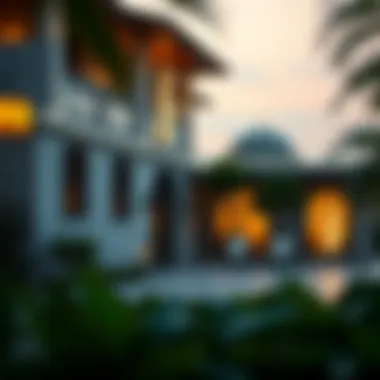

Investment Opportunities
Ramadan presents distinct investment opportunities for the astute investor. As the market shifts, recognizing which assets are in demand can lead to lucrative returns. Focus on areas rich in cultural heritage or near festivities can be fruitful, particularly when considering future value appreciation after the Ramadan season.
With local and international tourists visiting the UAE for Ramadan experiences, short-term renting becomes exceptionally profitable. Properties near event venues or hotels witnessing a surge in tourism can yield higher rental yields than usual.
Moreover, real estate developers can anticipate the post-Ramadan market trends. Building residences equipped for modern conveniences tailored to large families or community experiences can ultimately meet the growing demand post-festivities. For those looking to invest, keeping an eye on new project announcements or offerings during this time is also wise.
In summary, Ramadan's influence on real estate is multifaceted. The trends observed during the month provide golden opportunities for investors, homebuyers, and real estate professionals as they navigate through this holy month and beyond.
Community and Family Dynamics
The interwoven fabric of community and family dynamics shines particularly bright during Ramadan in the UAE. This period is more than just a month of fasting; it serves as a pivotal point for strengthening familial ties and fostering social connections. Engaging in shared activities—from preparing Iftar meals to community prayers—helps solidify bonds and facilitates the nurturing of shared values. It’s a communal experience that shapes identities and reinforces traditions, which are often passed down through generations.
Benefits of Community and Family Engagement
- Strengthening Relationships: Ramadan provides a natural opportunity for families to gather more frequently. Shared meals and prayers create a sense of belonging, creating cherished memories for both young and old.
- Support Networks: The month fosters a spirit of cooperation among community members. Whether it’s helping with meal preparations or organizing charity drives, the collective effort bolsters relationships and support networks.
- Culturally Rich Experiences: Families engage in cultural traditions, which enhances the educational aspect of Ramadan for younger family members. From storytelling to participating in festivals, children learn about their heritage.
- Charitable Acts: Many families join forces to perform charitable acts during Ramadan, such as donating to local mosques or distributing food to those in need. This fosters empathy and reinforces the significance of community support.
Role of Family Gatherings
Family gatherings during Ramadan manifest in various forms, often centered around the nightly ritual of breaking the fast—known as Iftar. The act of coming together at sunset to enjoy a meal serves as a reminder of the importance of unity and shared experience.
The planning of these gatherings often begins well before sundown, highlighting a shared commitment to family traditions. These occur in homes filled with rich aromas of traditional dishes like Harees and Knafeh, bringing back nostalgic feelings for many. Parents and grandparents take center stage, passing down recipes and practices that emphasize the connection to their roots.
Important Aspects of Family Gatherings:
- Culinary Traditions: Dishes are not merely food but act as a bridge connecting generations. Recipes exchanged over steaming plates foster discussions that enlighten younger members about family history.
- Religious Observance: Attending prayers together, particularly the Taraweeh which occur after Iftar, reinforces the spiritual aspect of Ramadan. It strengthens family bonds through shared religious devotion and reflection.
"Family is a patchwork quilt of shared moments, especially woven tighter during the sacred months like Ramadan."
Social Cohesion Through Ramadan
Ramadan acts as a unifying force within the UAE, transcending individual family units and binding the entire community together. When Iftar is broken, it is not just the family that sits together; neighbors and friends often join in too, regardless of differences. This blending fosters social harmony and inclusion, making the month even more special.
Key Elements of Social Cohesion:
- Community Iftars: Many neighborhoods and organizations host community Iftars, creating opportunities for people from diverse backgrounds to eat together. This brings a sense of togetherness that enhances mutual respect among varying cultures.
- Events and Celebrations: Public events during Ramadan encourage participation from all community members. Music, art, and festivals often characterize community gatherings, enhancing social interaction and cultural exchange.
- Dialogues on Shared Values: Ramadan often prompts conversations around shared values of generosity, empathy, and kindness, encouraging individuals to reflect on the importance of collective responsibility toward one another.
Concluding Remark: The fabric of community and family dynamics during Ramadan enriches the lives of those in the UAE. It’s a reminder that through shared experiences, traditions, and collective effort, society evolves into a more empathetic and cohesive unit.
Tourism and Ramadan Events
Ramadan, the holy month of fasting, feasting, and reflection, carries a unique flavor in the UAE, making it an intriguing time for tourists. The blend of cultural depth and festive spirit transforms the usual rhythms of life into something extraordinary. This section will delve into the significant role that tourism plays during Ramadan, focusing on how various events enhance the experience for both residents and visitors.
Annual Festivals and Activities
During Ramadan, many festivals and activities light up the UAE, showcasing the rich heritage and modern culture of this nation. One notable event is the Ramadan Night Market, typically held in various locations like Dubai and Abu Dhabi. This vibrant market brings together local artisans and food vendors, where tourists can try traditional dishes, shop for crafts, and even catch cultural performances. This market creates a bustling atmosphere, fully embodying the spirit of togetherness and celebration.
Moreover, the Iftar gatherings at large hotels and restaurants are not merely dining experiences; they are social events where people from diverse backgrounds come together to break their fast. These setups often feature extensive buffet spreads comprising Emirati and international culinary delights. One could find everything from dates and Arabic coffee to samosas, biryani, and mutton dishes, offering an authentic taste of the local palate. Visitors can partake in these communal meals, soaking in the warmth of hospitality that characterizes UAE culture.
Among various activities, cultural performances like traditional music shows and art exhibitions also form a significant part of Ramadan celebrations. Events such as the Dubai Mall's light displays and cultural exhibitions in museums reflect not only the UAE's past but also offer glimpses into the dynamism of its future.
"Ramadan in the UAE is neither just a religious observance nor a cultural festival; it’s a unique tapestry where tradition meets modern celebration."
Influence on Incoming Tourists
The influx of tourists during Ramadan can be attributed to various attractions, from culinary delights to cultural insights that patrons are eager to experience. The unique blend of spirituality and festivity during this time often attracts visitors looking to deepen their cultural understanding. Many come for the food, sure, but they often leave with stories of camaraderie and discoveries of a new culture. This period serves as an opportunity for tourists to witness first-hand how the local populace comes together in a profound yet celebratory manner.
However, it's essential for incoming tourists to be mindful of local customs and practices during Ramadan. For instance, while immersing in the local festivities, being respectful of fasting hours is crucial. Strolling through the markets or dining in open venues is acceptable but can be frowned upon if eating or drinking visibly during the day.
In a nutshell, tourism during Ramadan in the UAE is not just about attending events; it’s about experiencing an integral part of the Emirati way of life. With varied activities lined up, tourists are not only entertained but also culturally enriched. This cross-cultural engagement is what will keep rising interest in the UAE as a premier travel destination during Ramadan.
Culinary Experiences During Ramadan
Cuisine holds a prestigious role in the narrative of Ramadan celebrations in the UAE. This month not only embodies spiritual reflection but also serves as a canvas for culinary craftsmanship. Dining rituals during this period go beyond mere sustenance; they strengthen family bonds, promote community, and celebrate the rich tapestry of Emirati culture. As the sun dips below the horizon, the breaking of the fast transforms into a gathering filled with flavors, stories, and camaraderie.
Traditional Emirati Dishes
When it comes to traditional Emirati dishes, Ramadan brings a swirl of rich flavors and time-honored recipes to the table. One standout dish is Harees, made from wheat and meat, slow-cooked until it reaches a smooth, porridge-like consistency. It's comforting and filling, ideal after a day of fasting. Another popular choice is Majboos, a rice dish often spiced with a mix of aromatic herbs, served with chicken or lamb. Both dishes showcase the communal aspect of dining, as families often prepare large servings to share.
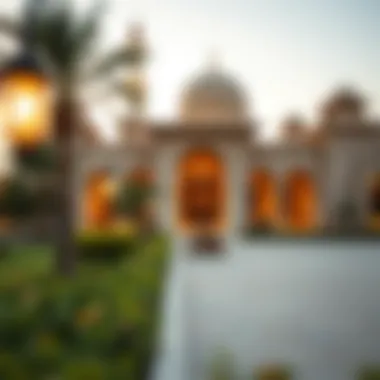

Furthermore, snacks such as Samboosa, deep-fried dough pockets filled with vegetables or meat, add a burst of flavor that tantalizes the taste buds. These savory treats are not just popular during Iftar but also emphasize social interactions among families and friends, as they are often exchanged between households.
- Key Traditional Dishes at Iftar:
- Harees
- Majboos
- Samboosa
- Luqaimat (sweet dumplings)
These dishes aren’t merely meals; they embody centuries of tradition passed down through generations, representing the heart of Emirati family gatherings.
Modern Culinary Trends
As the UAE embraces blending tradition with innovation, modern culinary trends have made their way into Ramadan celebrations. Chefs are experimenting with contemporary twists on classic dishes, offering fusion cuisines that reflect the multicultural fabric of the UAE’s society. For instance, the influence of international cuisines has resulted in new interpretations of traditional Iftar meals, such as sushi as a side dish or ramen-inspired preparations spiced with local flavors.
Moreover, health-conscious dining has started to gain momentum during Ramadan. Many restaurants have adapted their menus, carefully selecting ingredients that are both nutritious and fulfilling, catering to an increasingly health-minded populace. Vegan options that align with the spirit of fasting are also on the rise, with dishes featuring lentils, chickpeas, and hearty vegetables.
- Modern Trends Observed This Ramadan:
- Fusion foods blending local and international flavors
- Health-focused menus promoting nutrition during fasting
- Vegan and vegetarian options catering to diverse lifestyles
Ultimately, these culinary experiences reflect a dynamic world where tradition meets innovation, creating a vibrant backdrop that celebrates not only the holy month of Ramadan but also the essence of communal ties within the UAE.
In a place where cultures merge, every dish tells a story of tradition, innovation, and community spirit.
Are you curious to explore more about the culinary journey during Ramadan? Check local guides or resources like Britannica or local food blogs featuring Iftar events.
Health and Wellness During Ramadan
Ramadan is a period that calls for spiritual reflection, but it also brings to light the importance of addressing health and wellness. The fasting phase, from dawn till dusk, requires individuals to pay closer attention to their health needs and nutritional requirements. With the hustle and bustle surrounding daily activities, it can be easy to overlook how fasting affects the body. Understanding these factors is crucial for everyone observing Ramadan, especially in the UAE where the climate can further complicate things.
Nutrition and Hydration
Proper nutrition and hydration are paramount during Ramadan. The transition from regular eating patterns to fasting can throw one's body into a loop. It’s not just about what you eat, but when you eat that matters.
Three key points need highlighting:
- Breaking the Fast: Traditionally, Muslims break their fast with dates and water. Dates are packed with natural sugars, providing an instant energy boost. Additionally, they are rich in vitamins and minerals, which help to replenish what the body loses during the day.
- Suhoor Importance: The pre-dawn meal, known as Suhoor, lays the groundwork for endurance throughout the day. Foods high in fiber and protein, such as oats and eggs, can help maintain energy levels longer. Remember, drinking adequate water during Suhoor can help prevent dehydration during fasting hours.
- Avoiding Overindulgence: Post-Iftar, many people indulge in rich, heavy meals. While it might be tempting to feast after a long day of fasting, overindulgence can lead to discomfort and can counteract the health benefits of fasting. Keeping meals balanced with fruits, vegetables, lean proteins, and whole grains is wise.
Always aim for a well-rounded diet that includes a variety of food groups. Sticking to moderate portion sizes and ensuring you stay hydrated are keys to enjoying Ramadan fully without compromising health.
Physical Activity Adjustments
Staying active during Ramadan can be tricky, especially considering the changes in eating patterns and daily routines. However, it’s vital for both physical and mental well-being. Here are some adjustments worth considering:
- Timing is Key: Many people opt to change their exercise routines to after Iftar when they can hydrate and fuel afterwards. Night workouts can provide an excellent way to maintain fitness levels without the discomfort of fasting.
- Types of Exercise: Low to moderate intensity workouts like walking, stretching, or yoga are popular choices. They can help maintain fitness without overexerting oneself, especially during the first few days of fasting.
- Listen to Your Body: Everyone’s body responds differently to fasting. If you feel fatigued or lethargic, consider adjusting the intensity of your workouts or taking a break. It’s important to avoid pushing your limits, as this can lead to injuries or more profound exhaustion.
"Health is not just the absence of illness, but a state of complete physical, mental, and social well-being."
In summary, focusing on nutrition and making thoughtful adjustments to physical activity during Ramadan can enhance the experience while ensuring health remains a priority. Embracing the practices of mindful eating and responsible exercise will not only nourish the body but also elevate the spirit, allowing for a more fulfilling observance of this holy month.
Culmination: Ramadan's Legacy in the UAE
Ramadan in the UAE is more than just a month of fasting; it’s a tapestry woven with deep-rooted traditions, modern practices, and invaluable community ties. The importance of understanding Ramadan's legacy in the UAE cannot be overstated. It reflects the core values of unity, patience, and generosity that resonate throughout the diverse population of the Emirates.
Enduring Traditions
As this holy month concludes, one cannot overlook the enduring traditions that have stood the test of time. Iftar gatherings, for instance, transform the evenings into vibrant collective celebrations where families, friends, and even strangers are welcomed at the dinner table. Each bite of dates and water, the first eaten after sunset, carries with it centuries of tradition. With every meal served, there is an implicit acknowledgment of the significance of sharing and giving.
Moreover, the practice of Zakat, or charitable contributions, amplifies this spirit of altruism that Ramadan embodies. Many community members find themselves more inclined to distribute food, money, or services to those in need during this time. Mosques become hubs, inviting everyone from various walks of life to break bread and share blessings, thereby reinforcing social bonds that transcend economic and cultural barriers.
With these traditions, the UAE continues to showcase not only its Islamic values, but also a civic responsibility that fosters belonging and strengthens community infrastructures. These practices engender a sense of identity amongst Emiratis and expats alike, melding divergent cultures into a unique Ramadan experience.
Looking Ahead to Future Celebrations
As we look to the future, one can be optimistic about how Ramadan will evolve while retaining its essential foundation. The UAE demonstrates a remarkable ability to balance heritage with modernity. Future celebrations might integrate more technology, allowing families separated by distance to participate virtually in Iftar dinners or community events.
In addition, as global interest in the region grows, Ramadan events may attract even more tourists, setting a stage for cross-cultural exchanges that enrich the local experience. This could lead to innovations in culinary arts, community festivals, and even real estate opportunities, as businesses cater to the rising demand for Ramadan-themed offerings.
Regardless of where the winds of change blow, the essence of Ramadan is likely to remain intact. The UAE will keep its doors open, upholding its legacy of generosity, tolerance, and inclusivity, ensuring that future generations experience the deep connection and warmth that this spectacular month brings.
"The spirit of Ramadan is not limited to rituals; it’s an invitation to embrace humanity and celebrate our shared existence."
In closing, the celebration and observance of Ramadan in the UAE not only keep alive cherished customs but also pave the way for a future that honors the past. It holds valuable lessons for all of us, urging continual reflection and respect for traditions while welcoming the inevitable changes that come with time.
For further insights into Ramadan practices and heritage, consider exploring resources like Britannica or Wikipedia.
As we celebrate the legacy of Ramadan, we are reminded that its spirit lives on both in individual hearts and in the broader fabric of community life.


